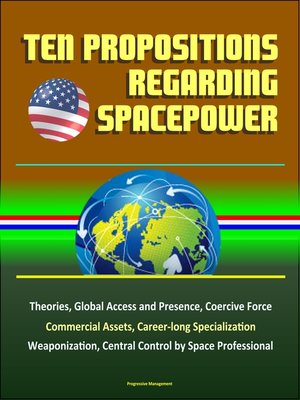Ten Propositions Regarding Spacepower
ebook ∣ Theories, Global Access and Presence, Coercive Force, Commercial Assets, Career-long Specialization, Weaponization, Central Control by Space Professional
By Progressive Management

Sign up to save your library
With an OverDrive account, you can save your favorite libraries for at-a-glance information about availability. Find out more about OverDrive accounts.
Find this title in Libby, the library reading app by OverDrive.



Search for a digital library with this title
Title found at these libraries:
| Loading... |
This excellent report has been professionally converted for accurate flowing-text e-book format reproduction. As political and military leaders ponder the future of space operations, the time has come to frame propositions regarding spacepower. Specifically, this study seeks to answer the question, "What is the nature of spacepower?" It also tests the aerospace integration school's hypothesis that spacepower is simply a continuation or extension of airpower. Two points come immediately to the forefront of this work. First, space-power is different from airpower even though both share the vertical dimension of warfare. Second, space operations have matured to a point wherein valid and unique propositions regarding spacepower are identifiable. The method used to derive these propositions involved literary research that resulted in a long list. The list evolved over three years during numerous brainstorming sessions with several space experts—most of them space weapons officers with theater and, often, combat experience—until the list was carefully refined into the 10 most salient propositions. The author deferred to Col Phillip S. Meilinger's approach, in Ten Propositions Regarding Air Power, of citing each proposition as a thesis statement, with supporting material immediately following. The objective of this work is to stimulate discussions and encourage those who do not yet understand or appreciate the nature of spacepower in modern warfare.
CHAPTER 1 - INTRODUCTION * Definitions * The Evidentiary Base * Methodology * Analytical Criteria * Hypothesis * Limitations of This Study * Overview * Notes * CHAPTER 2 - SCHOOLS OF THOUGHT ON AMERICAN SPACEPOWER * Lupton's Four Doctrines * The Historical Evidence * Alternative Strategies * Conclusions * Notes * CHAPTER 3 - THE TEN PROPOSITIONS * Proposition No. 1 - Space is a Distinct Operational Medium * Proposition No. 2 - The Essence of Spacepower Is Global Access and Global Presence * Proposition No. 3 - Spacepower Is Composed of a State's Total Space Activity * Proposition No. 4 - Spacepower Must Be Centrally Controlled by a Space Professional * Proposition No. 5 - Spacepower Is a Coercive Force * Proposition No. 6 - Commercial Space Assets Make All Actors Space Powers * Proposition No. 7 - Spacepower Assets Form a National Center of Gravity * Proposition No. 8 - Space Control Is Not Optional * Proposition No. 9 - Space Professionals Require Career-Long Specialization * Proposition No. 10 - Space Weaponization Is Inevitable * Notes * CHAPTER 4 - A SPACEPOWER THEORY * The Nature of Spacepower * The Hypothesis Is Rejected * Lessons Learned * The Theory * Unfinished Business * Notes * Appendix A - Oberg's 12 Truths and Beliefs about Spacepower * Appendix B - Gray's Eight "Clausewitzian" Ideas about Spacepower * Appendix C - Gray's Seven Most Vital Assumptions about Spacepower * Appendix D - Mantz's 10 Axioms of Space Combat Power * Appendix E - Findings and Recommendations of the Commission to Assess United States National Security Space Management and Organization (Space Commission Report)
Chapter 2 uses the framework proposed by David E. Lupton in On Space Warfare to provide a brief summary of the evolution of American spacepower doctrine. The purpose of this discussion is to familiarize the reader with the political and military environment in which spacepower evolved and operates. It exposes shifts in the geopolitical landscape that may cause America to dramatically alter its spacepower doctrine, making it more important than ever for policy makers to understand the fundamentals of spacepower.






